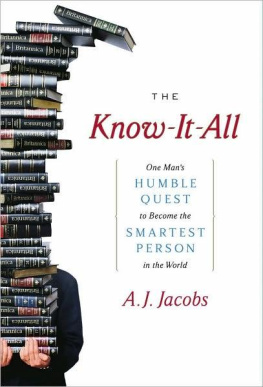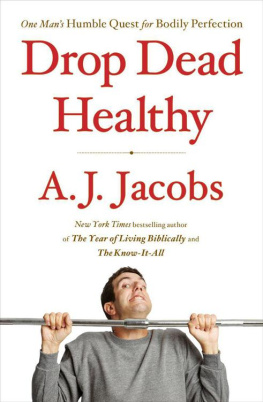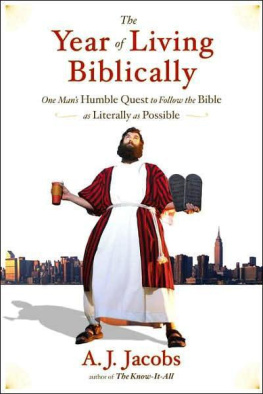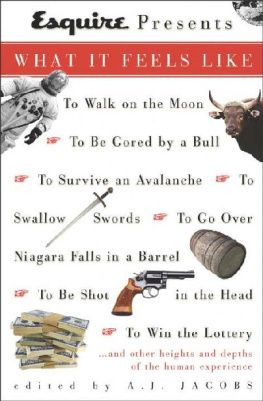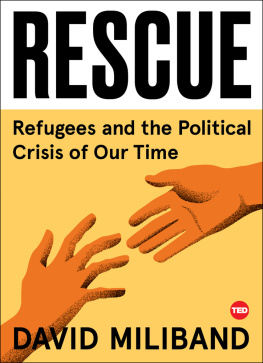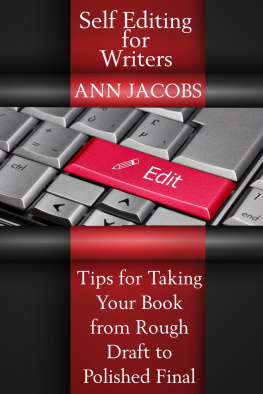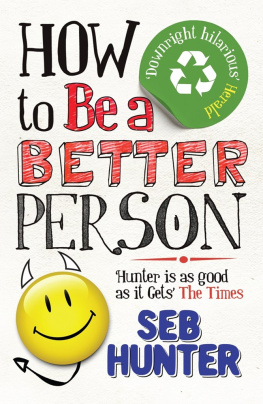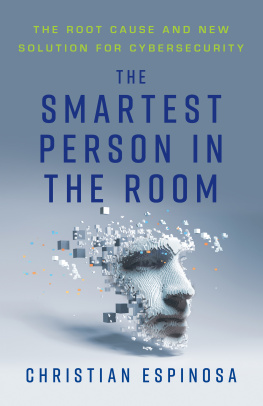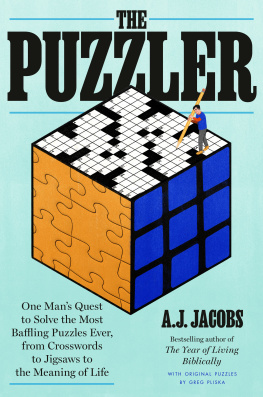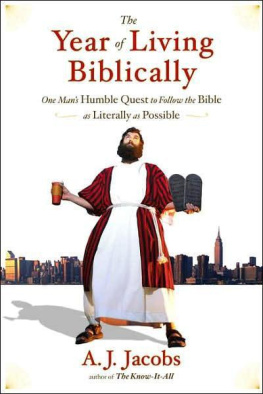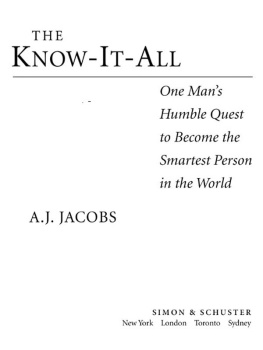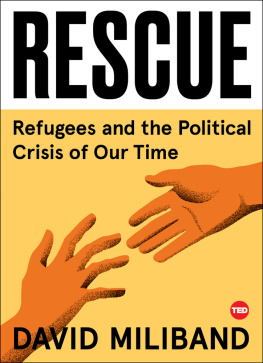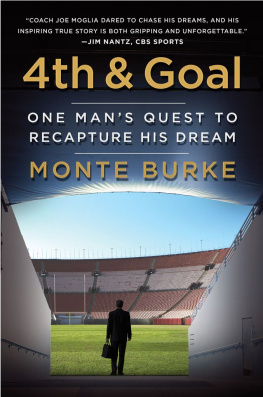A. J. Jacobs - The know-it-all: one mans humble quest to become the smartest person in the world
Here you can read online A. J. Jacobs - The know-it-all: one mans humble quest to become the smartest person in the world full text of the book (entire story) in english for free. Download pdf and epub, get meaning, cover and reviews about this ebook. year: 2004, publisher: Simon and Schuster, genre: Art. Description of the work, (preface) as well as reviews are available. Best literature library LitArk.com created for fans of good reading and offers a wide selection of genres:
Romance novel
Science fiction
Adventure
Detective
Science
History
Home and family
Prose
Art
Politics
Computer
Non-fiction
Religion
Business
Children
Humor
Choose a favorite category and find really read worthwhile books. Enjoy immersion in the world of imagination, feel the emotions of the characters or learn something new for yourself, make an fascinating discovery.
- Book:The know-it-all: one mans humble quest to become the smartest person in the world
- Author:
- Publisher:Simon and Schuster
- Genre:
- Year:2004
- Rating:5 / 5
- Favourites:Add to favourites
- Your mark:
- 100
- 1
- 2
- 3
- 4
- 5
The know-it-all: one mans humble quest to become the smartest person in the world: summary, description and annotation
We offer to read an annotation, description, summary or preface (depends on what the author of the book "The know-it-all: one mans humble quest to become the smartest person in the world" wrote himself). If you haven't found the necessary information about the book — write in the comments, we will try to find it.
The know-it-all: one mans humble quest to become the smartest person in the world — read online for free the complete book (whole text) full work
Below is the text of the book, divided by pages. System saving the place of the last page read, allows you to conveniently read the book "The know-it-all: one mans humble quest to become the smartest person in the world" online for free, without having to search again every time where you left off. Put a bookmark, and you can go to the page where you finished reading at any time.
Font size:
Interval:
Bookmark:

Also by A.J. Jacobs
THE TWO KINGS: JESUS AND ELVIS
AMERICA OFF-LINE
ESQUIRE PRESENTS: WHAT IT FEELS LIKE ( EDITOR )


SIMON & SCHUSTER
Rockefeller Center
1230 Avenue of the Americas
New York, NY 10020
Copyright (c) 2004 by A.J. Jacobs
All rights reserved, including the right of reproduction in whole or in part in any form.
SIMON & SCHUSTER and colophon are registered trademarks of Simon & Schuster, Inc.
This book is an account of the author's experience reading the Encyclopaedia Britannica. Some events appear out of sequence, and some names and identifying details of individuals mentioned have been changed.
Book design by Helene Berinsky Index by Sydney Wolfe Cohen
Library of Congress Cataloging-in-Publication Data
Jacobs, A. J., 1968
The know-it-all : one man's humble quest to become the smartest person in the world / A.J. Jacobs
p. cm.
1. Encyclopaedia Britannica. 2. Learning and scholarship. 3. Jacobs, A. J., 1968- 4. United States--Intellectual life--20th century. 5. United States--Intellectual life--21st century. I. Title.
AE5.E44J33 2004
031--dc22 2004048233
ISBN 0-7432-7260-9
Visit us on the World Wide Web:
http://www.SimonSays.com
To my wife, Julie
Acknowledgments
I want to thank Rob Weisbach, who is not only the smartest editor in the world, but a great, kind, and absurdly supportive friend. Thanks also to Peter Breslow and Scott Simon and all the big brains at NPR. I'm grateful to Ted Allen, Shannon Barr, Ginia Bellafonte, Steve Bender, Brian Frazer, Stephen Kory Friedman, David Granger, Andrew Lund, Rick Marin, Victor Ozols, Tom Panelas, Brendan Vaughan, and Andy Ward. I'm indebted to my family and my wife's family who, instead of objecting to this massive invasion of their privacy, were nothing but encouraging. And of course, thanks to my wife Julie, who, when she agreed to marry me, made me the luckiest man in the world.
Introduction
I know the name of Turkey's leading avant-garde publication. I know that John Quincy Adams married for money. I know that Bud Abbott was a double-crosser, that absentee ballots are very popular in Ireland, and that dwarves have prominent buttocks.
I know that the British tried to tax clocks in 1797 (huge mistake). I know that Hank Aaron played for a team called the Indianapolis Clowns. I know that Adam, of Bible fame, lived longer than the combined ages of the correspondents of 60 Minutes and 60 Minutes II (930 years, to be exact). I know that South America's Achagua tribe worshiped lakes, that the man who introduced baseball to Japan was a communist, and that Ulysses S. Grant thought Venice would be a nice city "if it were drained."
I know all this because I have just read the first hundred pages of the Encyclopaedia Britannica. I feel as giddy as famed balloonist Ben Abruzzo on a high-altitude flight--but also alarmed at the absurd amount of information in the world. I feel as if I've just stuffed my brain till there are facts dribbling out of my ears. But mostly, I am determined. I'm going to read this book from A to Z --or more precisely, a-ak to zywiec. I'm not even out of the early A s, but I'm going to keep turning those pages till I'm done. I'm on my way. Just 32,900 pages to go!
How did this happen? How did I find myself plopped on my couch, squinting at tiny font about dwarf buttocks and South American lakes? Let me back up a little.
I used to be smart. Back in high school and college, I was actually considered somewhat cerebral. I brought D. H. Lawrence novels on vacations, earnestly debated the fundamentals of Marxism, peppered my conversation with words like "albeit." I knew my stuff. Then, in the years since graduating college, I began a long, slow slide into dumbness. At age thirty-five, I've become embarrassingly ignorant. If things continue at this rate, by my fortieth birthday, I'll be spending my days watching Wheel of Fortune and drooling into a bucket.
Like many in my generation, I've watched my expensive college education recede into a haze. Sure, I remember a couple things from my four years at Brown University. For instance, I remember that a burrito left on the dorm room floor is still somewhat edible after five days, as long as you chew really hard. But as for bona fide book learning? Off the top of my head, I recall exactly three things from my classes:
1. When my comp lit professor outed Walt Whitman.
2. When the radical feminist in my Spanish class infuriated the teacher by refusing to use masculine pronouns. " La pollo." "No, el pollo." " La pollo." "No, no, no, el pollo." Et cetera.
3. When the guy in my Nietzsche seminar raised his hand and said, "If I listen to one more minute of this, I'm going to go crazy," then promptly stood up, walked to the back of the class, and jumped out the window. It was a ground-floor window. But still. It was memorable.
My career choices are partly to blame for my intellectual swan dive. After college, I got a job as a writer at Entertainment Weekly, a magazine devoted to the minutiae of movies, TV, and music. I crammed my cranium with pop culture jetsam. I learned the names of 'N Sync's singers--as well as their choreographer. I could tell you which stars have toupees, which have fake breasts, and which have both. But this meant anything profound got pushed out. I could talk confidently about the doughnut-eating Homer, but I'd forgotten all about the blind guy who wrote long poems. I stopped reading anything except for tabloid gossip columns and books with pictures of attractive celebrities on the cover. In my library, I actually have a well-thumbed copy of Marilu Henner's autobiography. Things improved slightly when I got a job as an editor at Esquire magazine (I now know that Syrah and Shiraz are the same wine grape), but still, my current knowledge base is pathetically patchy, filled with gaps the size of Marlon Brando--whose autobiography I've read, by the way.
I've been toying with the idea of reading the Britannica for years. Since I haven't accomplished anything particularly impressive in my life, unless you count my childhood collection of airsickness bags from every major airline, I've always thought of this as a good crucible. The tallest mountain of knowledge. My Everest. And happily, this Everest won't cause icicles to form on my ears or deprive me of oxygen, one of my favorite gases. I'll get a crash course in everything. I'll leave no gap in my learning unfilled. In this age of extreme specialization, I will be the last guy in America to have all general knowledge. I'll be, quite possibly, the smartest man in the world.
I've actually dabbled in reference books before. After college, I spent a couple of days poring over Webster's dictionary--but mostly I was looking for two-letter words that I could use in Scrabble to make annoyingly clever moves. (I was kind of unemployed at the time.) And that turned out to be a very successful experience. You can bet your bottom xu (Vietnamese monetary unit) that I kicked the butt of my jo (Scottish slang for girlfriend) without even putting on a gi (karate outfit).
But the encyclopedia idea I stole from my father. When I was a freshman in high school, my dad, a New York lawyer, decided he was going to read the Britannica. My father is a man who loves learning. He went to engineering grad school, then to business grad school, then to law school. He was about to enroll in medical school when my mom told him that maybe it'd be a good idea to get a job, since jobs earn money, which is kind of helpful when trying to buy food. But even with a day job, he continued his book addiction and scholarly writing. Back in 1982, he decided the Britannica was a good way to become an instant expert on all subjects. He made it up to the mid- B s--I think it was right around Borneo --before giving up, blaming his busy schedule. Now I'm going to take up the cause. I'm going to redeem the family honor.
Next pageFont size:
Interval:
Bookmark:
Similar books «The know-it-all: one mans humble quest to become the smartest person in the world»
Look at similar books to The know-it-all: one mans humble quest to become the smartest person in the world. We have selected literature similar in name and meaning in the hope of providing readers with more options to find new, interesting, not yet read works.
Discussion, reviews of the book The know-it-all: one mans humble quest to become the smartest person in the world and just readers' own opinions. Leave your comments, write what you think about the work, its meaning or the main characters. Specify what exactly you liked and what you didn't like, and why you think so.

